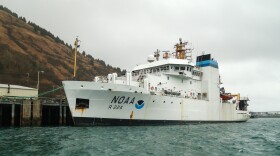-
Alaska’s congressional delegation introduced legislation Wednesday that aims to reduce bycatch in parts of southwest Alaska using better marine data, technology and gear.
-
The administration has made aggressive cuts to fisheries management since taking office this year.
-
The Alaska Fisheries Science Center, which studies and helps oversee Alaska’s marine resources, may have lost more than 5% of its staff at once.
-
The Aleut Community of St. Paul Island announced Friday that it has signed an agreement with the federal government aimed at jointly managing the waters surrounding the Bering Sea island.
-
Scientists have long thought that the genetic diversity of the Alaska red king crab fell into three main groups. But researchers recently found that the species should be split into six, maybe even seven, genetically distinct groups.
-
The Bering Sea pollock fishery is getting a 6% increase in its total catch limit next year. The North Pacific Fishery Management Council on Friday approved 2025 catch amounts for Alaska’s federal fisheries, setting the Bering Sea pollock fishery at 1.375 million metric tons—up from 2024’s 1.3 million.
-
Scientists had previously linked the crash of the Bering Sea snow crab population to warming ocean waters. But a new study released by the National Oceanic and Atmospheric Administration on Aug. 21 deepens the connection between human-caused climate change and the die off.
-
Years after two crab fisheries disasters occurred in the Norton Sound and Bering Sea, millions in relief funds are finally available to impacted fishermen.In March of 2020 a fishery disaster was declared for the 2019 Norton Sound Red King crab fishery and a year later for the 2019-2020 Bering Sea Tanner crab fishery. Roughly four years later, affected fishers can now apply to receive a portion of $14,368,336 in total federal relief funds for both fisheries.
-
The pollock fishery currently has a cap on Chinook bycatch, but those asking for stricter limits say the restrictions don’t go far enough.
-
The Alaska Marine Mammal Stranding Network is working with local responders to gather images and information to coordinate helping an entangled humpback in Unalaska’s Iliuliuk Bay.

Play Live Radio
Next Up:
0:00
0:00
Available On Air Stations










